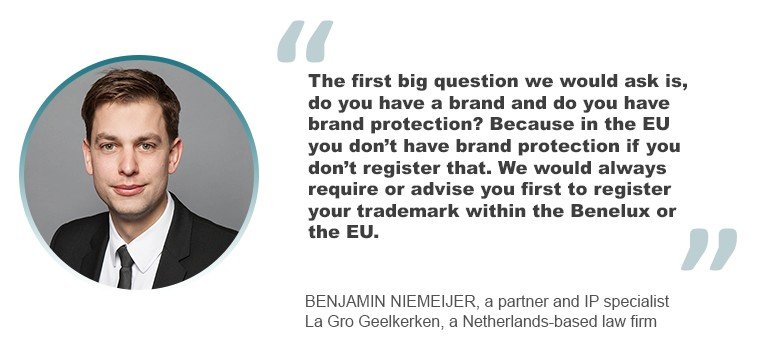The scale of the European Union’s e-commerce market and issues within it likely to affect Asian exporters were discussed at length in a recent webinar jointly organized by Enterprise Singapore and the Holland International Distribution Council (HIDC).
Firstly, there can be no doubting the scale of the EU’s existing market of some 400 million middle class consumers and its ongoing potential, with growth of 12%-15% expected this year, reported Alan Yeo, director of Enterprise Singapore’s Retail and Design Unit.
“There is a good opportunity there,” said Yeo.
In cash terms, the market is valued at €235 billion (US$272.6 billion) with some 286 million already-established customers, of whom 217 million are used to buying from abroad and online, added Jasper Eggebeen, senior manager, Supply Chain Solutions, for HIDC in Amsterdam.
It is not a homogenous market, though. The Western countries – France, Great Britain and Germany – are the largest, and more developed, countries, accounting for more than 50% of all online sales. But countries in the south and east are growing fast.
First, however: big, though, the potential is, specific responses will be needed, said Eggebeen, “Focussing on key markets is a good strategy.”
Second: Amazon, eBay and AliExpress already have a big presence, and appear to be set to grow from their current combined 59% of global market share to 65% by 2025, said Eggebeen.
Against this are pure markets, which specialize in only one line or product, such as shoes. Pure markets are set to become more important in the near future, taking 75% of the market, up from the current 68%, in 2025. “It’s very important to take into account the power these market players have globally, and also in Europe,” Eggebeen added.
But there will likely be plenty to go around. By 2025, the European e-commerce market will be worth more than US$569 billion. It will have a different structure than it does now, with omni channel and social shopping becoming more prevalent and customers wanting a lot more personalization of goods.
Adding to the pressure is the increasingly high levels of service demanded by European consumers and the increasing importance of an exact last mile delivery. This is complicated by preferences within Europe: Poland favours the parcel locker, France the parcel shop and the Dutch like packages to be brought to their homes.
The one to watch, though, is the expected rise of business-to-business e-commerce. “Companies are getting used” to buying things online, said Eggebeen.
There is one last potential stumbling block for e-commerce providers. Or, as it was put during the webinar, “the reality check.” Four-fifths – 80% – of web shops make little or no profit, and 4% of these shops have some 85% of the turnover. This is a sector which is highly competitive and needs careful entry, which is the HIDC’s role. “We can help you set up in a smart way,” said Eggebeen.
Other advice he gave, which was underlined by others, including Ad Meisen, the Netherlands-based director and founder of Brightways, an Amazon-focused logistics provider, is that one of Europe’s larger national markets is a good place to start. Potential shop owners should also ensure they understand the complexity of local legislation, particularly regarding tax and privacy laws.
Before facing the practicalities of doing business in Europe, potential shop owners must first actually enter the EU market, said Benjamin Niemeijer, a partner and IP specialist from La Gro Geelkerken, a Netherlands-based law firm. Assuming there was already an existing company in Singapore, he asked companies to ask themselves if they wanted to establish a new company overseas, mentioning the Netherlands in particular.
“The first big question we would ask is, do you have a brand and do you have brand protection? Because in the EU you don’t have brand protection if you don’t register that. We would always require or advise you first to register your trademark within the Benelux or the EU,” said Niemeijer. “If you forget you [can end up with] a lot of trouble if someone uses your name.”
This is turn brings in the issue of domain name registration, something entrant companies need to think about.
What is a likely first for some logistics companies is the need to think about issues such as privacy, noted Niemeijer.
This is laid down in the EU-wide General Data Protection Regulations (GDPR), which introduce responsibilities for companies about how data is to be kept secret and used, as well as a clear commitment report breaches without undue delay. “Big penalties” await those who don’t do this, said Niemeijer.
Another issue flagged by Niemeijer was that new VAT rules apply in the EU for e-commerce entrepreneurs operating in the Netherlands. Turnover of €10,000 (US$11,600) outside of the Netherlands is required, otherwise Dutch VAT will apply.
Importantly the VAT exemption for import VAT on shipments with a value of up to and including €22 no longer applies. In this way, the EU creates a ‘level playing field’ for all sellers inside and outside the EU, Niemijer said. “When importing goods into the EU, import VAT is always due, regardless of the value of the shipment,” he added.
Customs legislation for e-commerce shipments has also changed. “For all shipments with a value of more than €150, an electronic declaration for import is mandatory,” he said.




